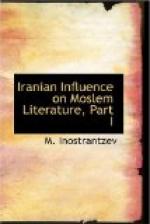which was prepared by Abu Mansur bin Abdar Razzak bin
Abdullah bin Ferrukh. So far our information
is surely trustworthy. For, Biruni testifies
to a Shahname by Abu Mansur bin Abdar Razzak of Tus.
According to the introduction, this man was a minister
of Yakub bin Laith Saffar, who was commissioned with
the work which he accomplished through a certain Sund
bin Mansur Mamari with the help of four competent people
from Khorasan and Sagistan in 360 A.H. The chronological
impossibility involved in the figure is removed by
Mohl who emends it to 260. Yakub ibn Laith got
a foothold in Khorasan in 253 A.H. and reigned till
265. Still this report involves much that is
incorrect. That the uncouth warrior Yakub who
was perpetually camping in the battle fields should
have possessed a sense for such a literary undertaking
is extremely improbable, though not altogether inconceivable.
May be, he was actuated by a political design, but
Abu Mansur bin Abdar Razzak did not live under Yakub
but flourished two or three generations later.
For he is either a brother of Muhammad bin Abdar Razzak
of Tus or Muhammad himself. The first surmise
has the weight of greater likelihood in that the Strasburg
manuscript calls him once Abu Mansur Ahmed and Muhammad
had in fact a brother named Ahmed who participated
in his political manouvres. Muhammad was the
lord of Tus. We hear much about him—how
he in the years A.D. 945-960 stood up now for the
Samanides, his proper overlords, now for their powerful
antagonist Ruknaddin, the Buide, whose capital lay
in dangerous proximity to his territory. In those
days when an enthusiasm for Modern Persian was strongly
awakened the enterprize may most appropriately have
been taken in hand. Immediately after the Princes
of Khorasan planned to cast this prose work into poetry;
and this task was first inaugurated by Dakiki for
the Samanides and brought to conclusion by Ferdausi
of Tus, countryman of Abu Mansur bin Abdar Razzak,
for Mahamud of Ghazna. The name of the four people
who executed the work for the son of Abdar Razzak
are all genuinely Persian; which indicates that they
were all adherents of the ancient religion and that
they had actully a Pahlavi original before them.
To transfer an Arabic version into Modern Persian
would not have required four men. Moreover, Firdausi’s
poem occasionally betrays that his sources had not
flowed to him through Arabic. Of those men one
only is met with again, Shahzan son of Barzin.
He is mentioned by Firdausi at the head of his account
of the genesis of KALILA WA DIMNA: “Listen
to what Shahzan, son of Barzin has said when he revealed
the secret.” Because this section is an
episode which assuredly did not appear in the KHODAY-NAMEH,
we may conclude that the prose Shahname on which this
Shahzan collaborated, embodied all manner of similar
episodes, though Firdausi may have taken several from
elsewhere. It is an interesting circumstance that
the potentate who had this work prepared by Abu Mansur
bin Abdar Razzak, had inserted—so Biruni
tell us—a fictitious genealogical tree in
it which led up his ancestors to Minochihr. Such
things were in those times very common among new men
of Persian origin who attained power. We are compensated
for the loss of this prose work by at least the epos
of Ferdausi which has issued from it.




